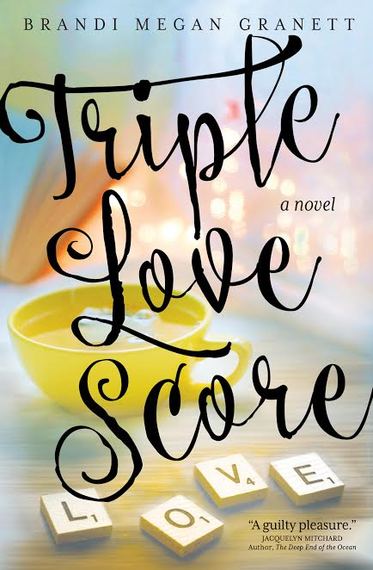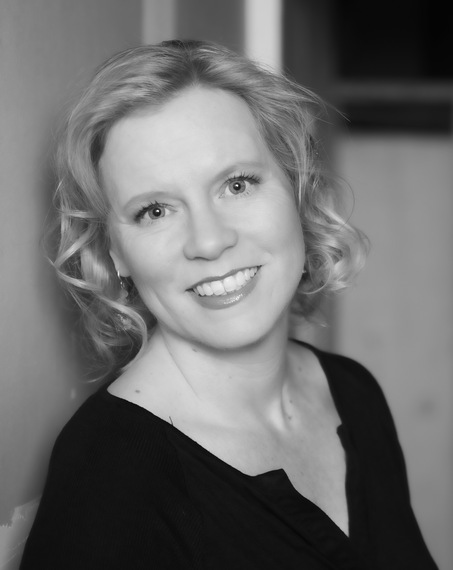I admit it: as a veteran Scrabble player, I was delighted to see the cover and title of Brandi Megan Granett's new novel, Triple Love Score. Even better, competitive Scrabble serves to move the narrative of this quirky, sweet romance forward, and the plot has enough twists to keep the writing original and readers guessing. In this interview, Granett talks about her inspiration for the novel, whether writers need an MFA, the ups and downs of publishing, what archery has taught her about being a writer, and much more.
Q. How did you come up with the unique plot premise of a poetry professor using a Scrabble board to write, and finding love along the way?
At the time, I was both playing a lot of online Scrabble and falling in love. I also challenged myself to write 500 words a day. Each day, I started writing without any plan or plot in mind. The things around me organically found their way into the novel.
Q. I was intrigued by the fact that you're an archer. What has archery taught you about writing?
Archery taught me so much about discipline. In order to rise through the ranks of Olympic recurve archery, an archer needs to immerse herself in practice, learning, and resources. Acquiring these skills through my sport enabled me to see how my writing efforts needed the same level of daily dedication, learning about craft, and support from outside resources and networking. At the end of the day, with both archery and writing, you only get out what you are willing to give.
Q. Before writing Triple Love Score, you earned an MFA in Fiction. Do you feel like aspiring writers need an MFA if they're going to succeed in the publishing world?
Not at all! But I do value what I learned in my MFA program and the time it gave me to write. MFAs are great for people who are looking to carve space for writing but need "permission" to do so. They also serve as a great avenue for people who love to read to see how writing is made. If writers do choose to go at it on their own, reading critically with a writer's eye is the one skill I feel they must cultivate.
Q. I earned an MFA many years ago, and I have to say that some people in that program were inclined to sneer at the whole romance genre, or at any fiction that seemed the least bit commercial, for that matter. Did you experience any of that? And were you always drawn to read and write romances?
I purposely chose to write something that was marketable. The manuscript I wrote as part of earning my PhD in creative writing takes several creative risks, such as spanning the YA and adult genres and using narrators of three different generations. While many people commended the beauty of the writing in that book, they lamented their inability to market a book like that. With Triple Love Score, I got tired of being literary and missing out on publishing opportunities. I wanted to try something new. Has anyone in the academy sneered at me? Not at all. In fact, most people just nod and say, "Good for you." Will it hurt me if I apply for tenure track teaching positions? Only time will tell!
Q. As I understand it from your blog, you had a pretty complicated path to love, marriage, and motherhood. Did any of your personal experiences inspire the experiences your main character, Miranda, goes through in this novel?
Like Miranda, I found myself needing to make choices about my life and whether or not I was willing to trust love. When I found myself divorcing my husband of many years, it became clear that what I thought was only a friendship could, or perhaps should, be something else. Risking things for love is hard enough. Risking a lifelong friendship is even harder.
Q. You published your first novel, My Intended, with a traditional publisher fifteen years ago, and this one with a small independent press. Publishing has gone through a seismic shift since your first book came out. How has your own publishing experience differed between now and back then? Any advice for aspiring authors who hope to publish a book one day?
I loved feeling like Nancy Cleary of Wyatt Mackenzie was on my team. With my first novel, Harper Collins bought William Morrow in the middle of my publishing process, and my entire team was fired. With Wyatt Mackenzie, my emails get answered, and I know Nancy is rooting for Triple Love Score as much as I am. For aspiring authors, I would tell them not turn their backs on any opportunity out of fear of what people might say about them. Maybe self-publishing is the way to go; maybe a small press, or maybe aim for the big 5 with a traditional contract! Each option in this marketplace presents pluses and minuses. At the end of the day, most authors hustle every day to get their book into readers' hands, no matter what publisher is on the spine.
Q. In addition to writing fiction, you work as an online teacher and mentor for writers. What do you see as the most common roadblocks to creativity, and how do you help people overcome them?
I work with a lot of people on memoirs, and the toughest obstacle I see is a fear of people's reactions or a desire to protect the ones we love. People fear putting things on the page that might get taken the wrong way, even if it is their truth. In these cases, I recommend Mary Karr's Art of the Memoir; Karr really lays it on the table and explains why you have to tell your story, your way. Another big roadblock I see is time. Writing time is precious and rare, and few people make an effort to find that time. This attitude can creep in and prevent you from ever getting anything done. I advise writers to do one thing: write. No matter the time or place, carve it out wherever you can.


